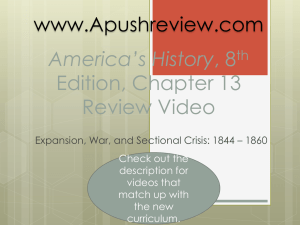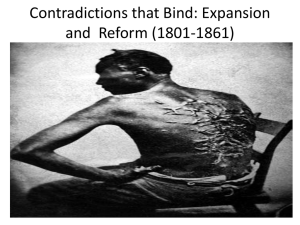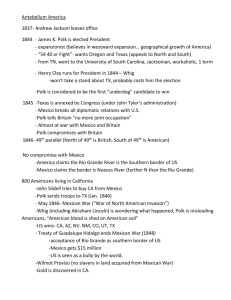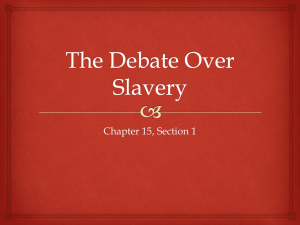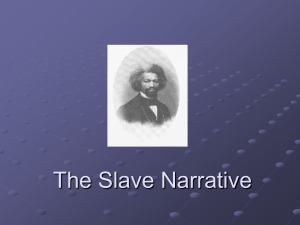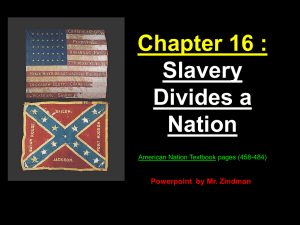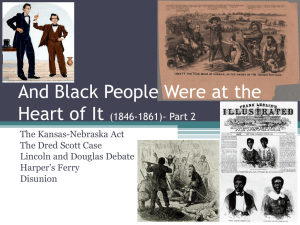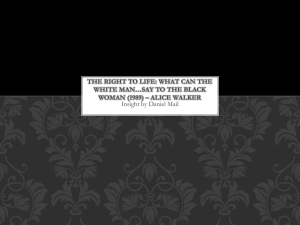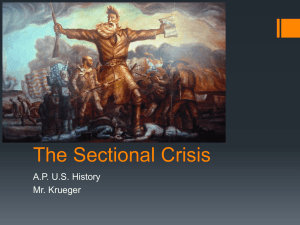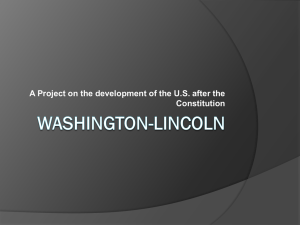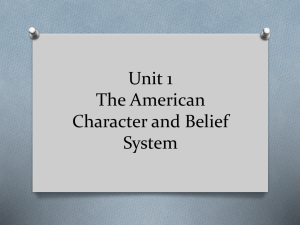The Coming Crisis
advertisement
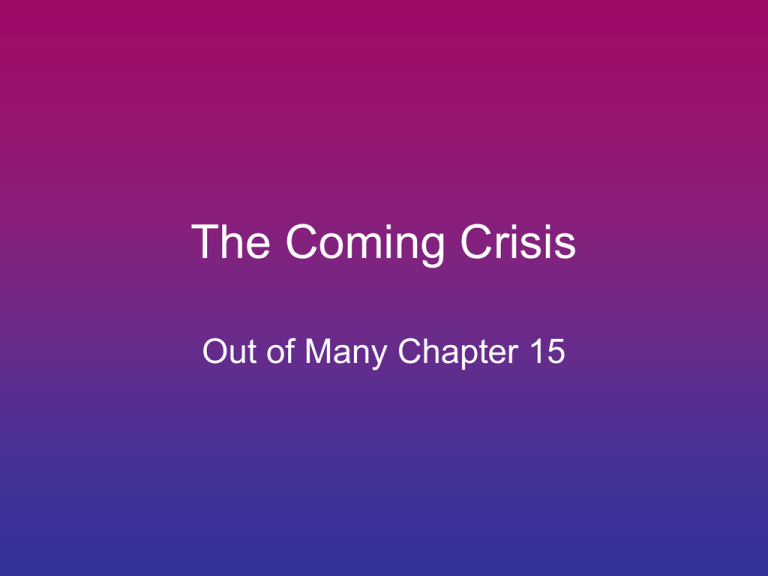
The Coming Crisis Out of Many Chapter 15 Expansion & Growth • Per capita income doubled from 18001850(no longer in the “developing” category) • Territory had tripled since 1800 • Number of states had almost doubled between 1800-1850 (16 to 31) • Rapid urbanization • Nationalism increased • Population=5.3 Mil to 23 mil Manifest Destiny • Based on the belief of American superiority of democracy • Revolutions of 1848 in Europe only increased American role as a democratic nation setting the example for others • Yet, internally we were struggling with our expression and actions of democracy Cultural Life & Social Issues • Uncle Tom’s Cabin – Harriet Beecher Stowe • Frederick Douglass – Autobiography • Writers focused on social criticism – Walt Whitman, Emily Dickinson – Nathaniel Hawthorne, Herman Melville, Henry David Thoreau • “American Renaissance” Read Aloud: Narrative of the Life of Fredrick Douglass, An American Slave • As I read, take note and imagine what it was like to be Fredrick Douglass. • Pay attention to the tone and emphasis on his detail of being a slave. Uncle Tom’s Cabin • Harriet Beecher Stowe • Sold more Political Parties & Slavery • Third Parties: reform, nativism, religion – Liberty Party – anti-slavery – Free Soil Party: no spread of slavery • advocating the rights of non-slaveholding whites • Formed from Whigs and Liberty parties • Sectional Leaders – Daniel Webster: New England – John C. Calhoun: South – Henry Clay: West John C Calhoun Henry Clay Daniel Webster States’ Rights & Slavery • Slaves are property: Constitution protects property & property owners • Slavery promotes democracy by making sure only the qualified had the power to vote • Slavery was a blessing to an inferior race – Paternalistic care for the workers • Slavery created the national prosperity Northern Fears of “The Slave Power” • Both North and South favor expansion and “manifest destiny” but have different aims • Each think the other is infringing on basic civil rights • Conspiracy to make the entire country a slave country – South demanded equality in the Senate – South wanted Senate veto power over presidential candidates Two Communities, Two Perspectives • Both North and South: – were committed to expansion, but each viewed manifest destiny in its own terms; and – shared a commitment to basic rights and liberties but saw the other as infringing on them. Debate & Compromise • Gold Rush forces the issue when CA wants to become a free state • Video Zachary Taylor • Zachary Taylor dies • Millard Fillmore – more interested in compromise • Video on Milliard Fillmore Compromise of 1850 • California is admitted as a free state • Fugitive Slave Law passed (Primary Source 15-1) • Outlawed slave trade in D.C. • Popular sovereignty for all territories • Redrew border of Texas/New Mexico The Fugitive Slave Act • Captured slaves were at the mercy of the slave catchers – no legal right to defend themselves in court • Federal government enforced it • Many blacks must now go to Canada for freedom • Convinced many in the North that slavery was a moral wrong – fugitives wrote of their experiences • Mobs in North tried to hinder apprehension of suspected runaways Escaped slave Anthony Burns The Election of 1852 • Franklin Pierce – Democrat & winner • Winfield Scott – Whig • John Hale – Free Soil • Tension at national conventions reveal cracks in the major political parties • Growing strength of third parties “Young America” The Politics of Expansion • Advocates free trade, social reform & expansion – John O’Sullivan “Go West Young Man” • 1854: Commodore Matthew Perry opened trade with Japan • Ostend Manifesto: proposed the U.S. buy or seize Cuba from Spain for expansion of slavery • Filibusters – individuals who became involved in the Caribbean and advocated the U.S. acquisition of territory there Stop: Review Learning Targets • Assign: Pages 505-515 • Learning Targets Lunch Bunch: Discuss learning of Chapters 13 and 14. Discuss DBQ Essay Kansas-Nebraska Act • Proposed by Stephen Douglas – needed transcontinental railroad to go through Illinois • Effectively repealed the Missouri Compromise line • Negated treaties with Native Americans • Kansas become battleground for sectional politics • Gave momentum to the Republican Party Bleeding Kansas • Violence between pro-slavery settlers and anti-slavery settlers • Competing governments – Beecher’s Bibles – New England Emigrant Aid Society – Missouri pro-slavery migration The Politics of Nativism • Backlash against immigration – particularly the Irish • The American Party – Know-Nothings – Limit immigration – Little impact because of division on slavery issue • Anti-Masonic Party – Single issue – Never gained wide support The Republican Party & The Election of 1856 • Republicans – national stage in this election • James Buchanan – Democrat – won but did not get a majority of the popular vote • John Freemont – Republican • Millard Fillmore – American “KnowNothing” Party • Split the country – North and South The Dred Scott Decision • Missouri Compromise is unconstitutional • Federal government could not interfere with the movement of property in the territories • Blacks are not citizens whether free or slave • North – more fear that the South wants to control the country • South – feels vindicated in their position on slavery The Lecompton Constitution • 4 state constitutions drafted before Kansas was admitted as a state • Pro-slavery – supported by President Buchanan • Turned down by Congress – ripped apart the Democratic Party • Sumner – Brooks beating in the Senate • Paved the way for Lincoln’s election in 1860 The Panic of 1857 • Bank failure in Ohio due to embezzlement caused British investors to remove money from U.S. investments • Falling grain prices • Collapse of land speculation programs based on future railroad expansion Lincoln-Douglas Debates • 1858 • Illinois Senate race – Douglas wins • Douglas accused Lincoln of favoring social equality for blacks – not true • Lincoln – House divided speech - “half-slave, halffree” • Popular Sovereignty John Brown Background • Age 12 – saw a slave beaten, became an abolitionist • North Elba, New York – Underground Railroad • Kansas – Pottawatomie Massacre – 5 dead – in response to sack of Lawrence • Married twice: 7 children with first wife, 13 children with second wife – of the 20, only 12 lived to adulthood John Brown’s Raid • Harper’s Ferry, Virginia (West Virginia) • 21 men – five blacks (3 free, 1 freed slave, 1 fugitive slave) • Attack armory – 100,000 muskets & rifles stored • Trapped in armory by townspeople and local militia • 9 killed, 7 hanged – two died in Civil War and three escaped Impact of John Brown’s Raid • Martyr to abolitionists • Julia Ward Howe – John Brown’s Body • Symbol of violence to Southerners • Hardens the position of both sides The Election of 1860 • Lincoln – Republican – one extreme • Breckenridge – Southern Democrat – other extreme • Douglas – Northern Democrat • John Bell – Constitutional Union – no position on slavery issue, former Whigs & Know Nothings • Stephen Douglas – only candidate with national appeal Narrow Victory The South Leaves the Union • South Carolina *** No surprise! – December 20, 1860 • Lincoln did not believe they should be permitted to secede – State Suicide theory • Buchanan as the lame duck president does nothing • By the time Lincoln takes office, 7 states have seceded • Jefferson Davis tries to portray this as a peaceful, legal step Establishment of the Confederacy • Southerners divide along up-country, lowcountry lines • Lincoln believed it was a crisis point for democracy – He decided to wait and see what happened before acting – Wanted to keep the union together – If I could save the Union without freeing any slave I would do it, and if I could save it by freeing all the slaves I would do it; and if I could save it by freeing some and leaving others alone I would also do that. Lincoln’s Inauguration • Death threats made him have to sneak into Washington, D.C. • Some Southern states had seized federal property • Pledged not to interfere with slavery where it existed but was firmly against secession and seizing property
